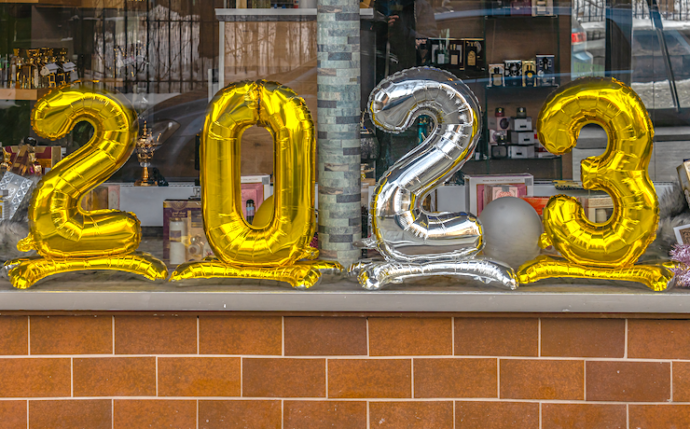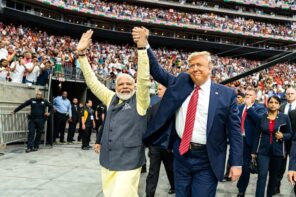Looking back at the past seven years, Christianity seems stronger than ever in the United States. Demographically, we remain a majority Christian country. Politically, nearly 90% of our federal congressional representatives identify as Christian, and we’ve never had an openly atheist president. Legally, we still punish people by making them pay penance in state penitentiaries. We organize the public school year around Christmas, and every time we write the date—right now, 2023—we implicitly acknowledge the birth of Jesus. Linguistically, we compulsively blurt out “bless you” when people sneeze, and let’s not forget that goodbye is a contraction of God be with ye. Christianity suffuses the world we live in—in big ways and small—whether or not we happen to be believers ourselves.

Beyond Doubt: The Secularization of Society
Isabella Kasselstrand, Phil Zuckerman & Ryan T. Cragun
NYU Press
May, 2023
Beyond Doubt is written like a victory speech. It delivers a comforting message to nonbelievers and anyone else worried that Christianity—particularly its evangelical iterations—will continue to dominate American politics and society. In fact, for anyone who decries Christianity’s dominance domestically or religious hegemonies around the world, Beyond Doubt brings good news—a euangelion, if you will, for political secularists.
Marshaling a preponderance of empirical evidence demonstrating declining religiosity around the world, the authors argue that as nations become more scientifically knowledgeable, technologically advanced, economically industrialized, and institutionally differentiated, people in those nations will become less religious as a matter of course. In short, as societies advance, religion recedes. This is the book’s core proposition.
Beyond Doubt tells a familiar story, but the book is unique in its simultaneously fastidious and sweeping evidence. Since the Enlightenment, many have theorized (some with hope and others with dread) that, as people attain greater material security and more empirical knowledge thanks to advances in science and technology, religion will become less relevant to their lives. According to this line of analysis, the processes of modernization progressively reveal religions to be primitive, irrational, and ineffective ways of responding to problems that are better solved through scientific, rational means.
To give an example, for many of us moderns today—even those who are religious—if someone in our family gets cancer, we take them to the oncologist rather than simply solicit God for supernatural healing. And for those among us who do rely on strictly religious means to solve material problems like disease, they’re met with scorn, contempt, and even disgust, as if they haven’t adequately kept astride with the march of progress.
In this way, as the authors contend, modernization entails a progressive movement away from “supernatural belief” towards “natural sciences” as the basis for individual action and social organization. While some people may choose to hold on to traditional religiosity for aesthetic and sentimental reasons—because religions tell comforting stories, inspire great works of art, and knit communities together—the authors ultimately suggest that the more we organize ourselves around the “natural” and “rational” principles of efficiency, equality, and empirical evidence, the better off we will be as a society.
As a secular person who studies religion professionally, I feel ambivalent about this story. On the one hand, as a citizen of the United States, I admittedly worry about Christian hegemony in this country; I’m disturbed by the fact that our politicians make secular laws based on their faith-based beliefs, which intimately affect many people who themselves do not share those religious commitments.
From this perspective, Beyond Doubt reassures me that as time goes on, people will become less religious, and we’ll be able to debate public policies based on empirically verifiable theories, without appeals to religious authority and revealed truths. However, on the other hand, I’ve heard this story—that “religion” is in decline—so many times it makes me wonder how much has really changed.
Beyond Doubt proves that fewer people go to church, that fewer people believe in God, that fewer people consult the Bible to make life decisions, etc., than ever before. But maybe these demonstrable changes don’t prove that “religion” is disappearing. These trends might suggest, rather, that “religion” is taking different forms in the modern world.
The book’s thesis that religion is diminishing—and its suggestion that we should celebrate its demise—depends entirely upon how we understand the meaning of “religion.” If “religion” refers to the shared concepts, activities, and institutions that allow us to think together about deep questions, to have a sense of collective identity that transcends time and space, and to give ourselves shared purpose beyond individual self-interest, then the decline of “religion” signifies something terrible for us all. In this regard, the less “religious” we become, the fewer conceptual, institutional, and symbolic resources we’ll have to help us think deeply together, identify collectively, and behave cooperatively.
However, as I think the authors would agree, the secularization detailed by Beyond Doubt doesn’t spell the death of deep questions, the end of meaning, or the dying gasps of getting together in communities with like-minded others. Neither does secularization signify the end of speculating about the origins of the universe, what happens when we die, or what’s right and wrong.
In fact, being secular doesn’t even mean that we no longer have faith in things unseen, that we no longer organize ourselves around shared symbols and rituals, or that we no longer share stories that give us collective purpose. To be sure, secularization certainly doesn’t mean that people behave more “rationally” than ever before. So, again, does secularization mean that religion is disappearing, or that it’s morphing into new forms?
The authors of Beyond Doubt acknowledge that religion remains an ambiguous term, and they carefully stipulate their working definition to sidestep these concerns:
“We define religion as the amalgamation of ideas, rituals, practices, symbols, identities, and institutions that humans collectively construct based upon their shared belief in the supernatural.”
The key word here is supernatural. The authors demonstrate beyond doubt that people around the world are organizing their practices, identities, and institutions less and less around belief in “supernatural” forces, like God, gods, angels, demons, ghosts, or spirits.
However, this definition and the way it restricts our conceptualization of “religion” makes me think of an organization like the Satanic Temple. In 2019, the IRS officially recognized the Satanic Temple as a religious organization, granting it 501(c)(3) tax-exempt status. Satanists themselves refer to their gatherings as “congregations,” and they call their leaders “ministers.” Furthermore, participation in the Satanic Temple involves (voluntary) rituals including Black Mass and Unbaptism. The Satanic Temple has a totemic symbol—the Baphomet pentagram—as well as a unifying figure, Satan. In these ways, Temple members undeniably avail themselves of the language, practices, institutions, and symbolic resources of religion to ponder perennial questions, generate collective identity, and sustain shared purposes. That is to say, they’re religious.
However, as religious as they obviously are, Satanists categorically deny belief in the supernatural. One of the FAQs on the Satanic Temple’s website asks, “Do you worship Satan?” Their reply: “No, nor do we believe in the existence of Satan or the supernatural.” As a follow up, a subsequent question clarifies, “If you do not believe in the supernatural, how is TST a religion?” They provide an emphatic response that encourages us to shift the way we think about religion and, accordingly, about secularization:
The idea that religion belongs to supernaturalists is ignorant, backward, and offensive . . . Are we supposed to believe that those who pledge submission to an ethereal supernatural deity hold their values more deeply than we do? Are we supposed to concede that only the superstitious are rightful recipients of religious exemption and privilege? Satanism provides all that a religion should be without a compulsory attachment to untenable items of faith-based belief. It provides a narrative structure by which we contextualize our lives and works. It also provides a body of symbolism and religious practice—a sense of identity, culture, community, and shared values.
Whatever one may think about the Satanic Temple in and of itself, its very existence, self-understanding, and especially its religious tax-exempt status should make us wonder whether modernization dispels religion from the world or just makes it change shape. The authors of Beyond Doubt insist that we must fix our definition of religion in order to reliably measure changes in religiosity over time, but concepts don’t have fixed definitions in real life. They change with the times. While this fact flummoxes quantitative sociological studies, which depend on precise categories, we have to keep our language flexible so we can accurately understand what’s going on in the world.
We all ask ourselves what’s real and how best to know reality. We all wonder about the good life and what makes things right and wrong. If the word “religion” means belief in supernatural forces, then the authors do demonstrate that people all over the world are increasingly doing these things without “religion.” In this way, Beyond Doubt might indeed be the death knell of a certain traditional way of organizing our lives around belief in the supernatural.
However, in my view, Beyond Doubt doesn’t so much prove once and for all that “religion” is disappearing; it actually heralds a new way of thinking that becomes possible with the end of a certain restrictive set of ideas—that “religion” necessarily means belief in the supernatural and that we need these supernatural beliefs to commit deeply to ethical principles, to form collective identities, and to generate shared purposes.
As a resolutely secular person myself who doesn’t believe in supernatural forces I still need big concepts that help me conceive and discuss existential questions. I need communities that I feel profoundly tied to, and rituals that mark important events in my life. I need shared narratives that provide me purpose and motivate me to work for something beyond my own self-interest. I think what I’m saying is that even though I’m secular, I need “religion.” Maybe we all do, even if “God is dead.”





